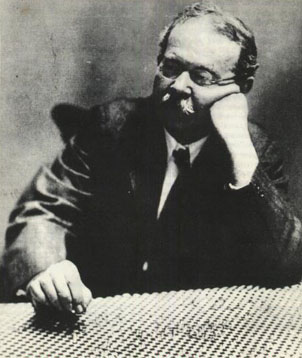
Mirror
I am silver and exact. I have no preconceptions.
Whatever I see, I swallow immediately.
Just as it is, unmisted by love or dislike
I am not cruel, only truthful –
The eye of a little god, four-cornered.
Most of the time I meditate on the opposite wall.
It is pink, with speckles. I have looked at it so long
I think it is a part of my heart. But it flickers.
Faces and darkness separate us over and over.
Now I am a lake.A woman bends over me.
Searching my reaches for what she really is.
Then she turns to those liars, the candles or the moon.
I see her back, and reflect it faithfully
She rewards me with tears and an agitation of hands.
I am important to her. She comes and goes.
Each morning it is her face that replaces the darkness.
In me she has drowned a young girl, and in me an old woman
Rises toward her day after day, like a terrible fish.
-Sylvia Plath
That was the last poem that writer Sylvia Plath wrote before she died. On that cold February morning she left out breakfast for her children, sealed the kitchen with wet towels, and placed her head in the oven. She was only thirty years old. Even so, her mark on the poetic world can still be seen today in the form of books and movies. She also serves as a muse to many poets and people who suffer from mental illnesses. Her influence has lead to a psychological theory called The Sylvia Plath Effect. In 2001 psychologist James Kaufman discovered that creative writers and poets (especially those that are female) are more likely to suffer from mental illnesses than workers in any other profession. Although this theory is seen as sham by many individuals, there is no arguing that many creative writers and poets have committed suicide and suffered from mental illness in the past. Here are two writers who may have proven this point:
Virgina Woolf

Virgina Woolf is a prime example of the Sylvia Plath Effect. She had a nervous breakdown
at the age of 13 after her mother died. Her father died shortly afterwards, leaving her in a complete state of mental duress that put her into an institution. On March 28, 1941 she filled her pockets with rocks and drowned in the River Ouse. Before the suicide she had suffered from yet another nervous breakdown. In her final note to her husband she wrote, "I feel certain that I am going mad again. I feel we can't go through another of those terrible times. And I shan't recover this time. I begin to hear voices, and I can't concentrate. So I am doing what seems the best thing to do. You have given me the greatest possible happiness. You have been in every way all that anyone could be. I don't think two people could have been happier 'til this terrible disease came. I can't fight any longer. I know that I am spoiling your life, that without me you could work. And you will I know. You see I can't even write this properly. I can't read. What I want to say is I owe all the happiness of my life to you. You have been entirely patient with me and incredibly good. I want to say that — everybody knows it. If anybody could have saved me it would have been you. Everything has gone from me but the certainty of your goodness. I can't go on spoiling your life any longer. I don't think two people could have been happier than we have been."
Sara Teasdale
I Shall Not Care
When I am dead and over me bright April
Shakes out her rain-drenched hair,
Though you should lean above me broken-hearted,
I shall not care.
I shall have peace, as leafy trees are peaceful
When rain bends down the bough,
And I shall be more silent and cold-hearted
Than you are now.
-Sara Teasdale
Sara Teasdale died when she took an overdose of sleeping pills. An urban legend states that the poem above was written by a bitter Teasdale as a suicide note to a former flame. This legend is certainly false (the poem was actually published 18 years after her death). Teasdale's suicide is interesting because it was preceded by the suicide of her very close friend Vachel Lindsay who died by drinking Lysol. Lindsay was also a writer. Was this the effect proving itself once again?
Another suicide that is of much note (but has nothing to do with the effect) is the death of Assia Wevill. Wevill had an affair with Sylvia Plath's husband Ted Hughes. In 1969 Wevill and her daughter died after Wevill took their lives in a way that was shockingly similar to the way Sylvia Plath died. Wevill laid down with her sleeping child, blocked off all doors and windows, and turned on the gas stove. Her death is another haunting reminder of the legacy of the great Sylvia Plath.
The life of a writer is a hard one. Being a writer requires one to dig deep inside themselves and sometimes also requires a great deal of pain. So the next time you read the poems of Sara Teasdale or a Virginia Woolf novel, shed a tear for these great women who suffered for their amazing work.
 Suicide, abortion, cannibalism, and sodomy are not subjects one would ever associate with a church. That is unless said church is the Church of Euthanasia. The Church of Euthanasia (CoE) holds these four principals as its pillars of faith, seeing them as a Christian would see the Ten Commandments. Started by musician Chris Korda (shown above), the church's main commandment is "Thou Shall Not Procreate". The CoE does whatever it takes to highlight the overpopulation problems that plague the Earth. From protesting pro-life rallies with crucified blow up dolls to posting videos of the attacks on the world trade center paired with porn, the CoE never fails to shock the hell out of America. Just look at this lovely photo of a church billboard:
Suicide, abortion, cannibalism, and sodomy are not subjects one would ever associate with a church. That is unless said church is the Church of Euthanasia. The Church of Euthanasia (CoE) holds these four principals as its pillars of faith, seeing them as a Christian would see the Ten Commandments. Started by musician Chris Korda (shown above), the church's main commandment is "Thou Shall Not Procreate". The CoE does whatever it takes to highlight the overpopulation problems that plague the Earth. From protesting pro-life rallies with crucified blow up dolls to posting videos of the attacks on the world trade center paired with porn, the CoE never fails to shock the hell out of America. Just look at this lovely photo of a church billboard: 



















.jpg)





































